Our Projects
Urban food security through Kitchen/Micro gardening
Lahore is rapidly urbanizing, with around 1088 people moving into Lahore every day. This accelerated urbanization is profoundly impacting our city – in economic, social and environmental dimensions – which therefore necessitates re-examination of the ways in which Lahore is provisioned with food. One of the main challenges is to meet the food and nutrition requirements of the expanding urban low income population. The urban poor are spending up to 70 percent of their income on food, making this a key aspect of daily urban life. Furthermore, good nutrition is linked with a healthier, smarter and more productive population. In order to build a better city, city leaders must also recognize the importance of building sustainable access to nutritious foods for all.
The City Without Hunger aims to combat malnutrition of low income households and bringing environmental and social benefits to the geographical community through an integrated approach.
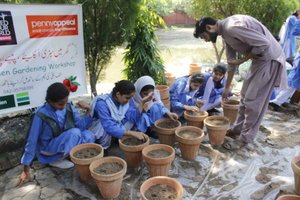

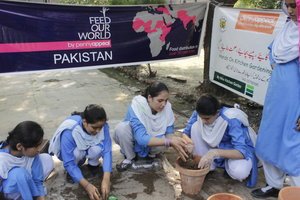
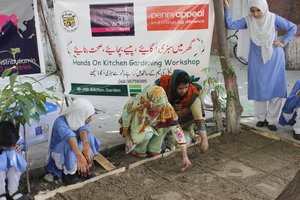
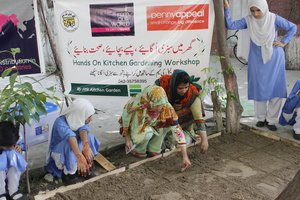
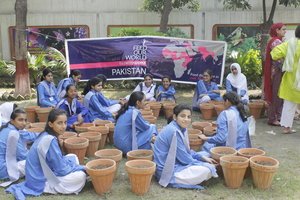
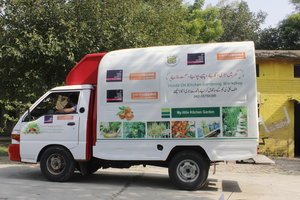
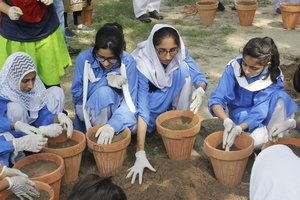
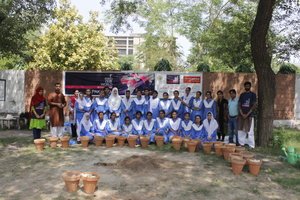
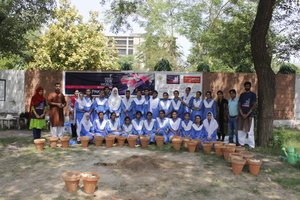
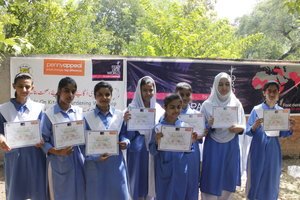
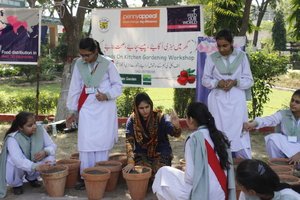
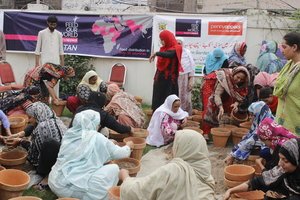

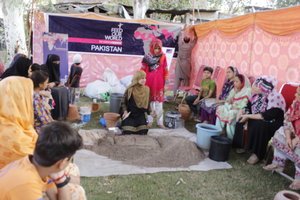
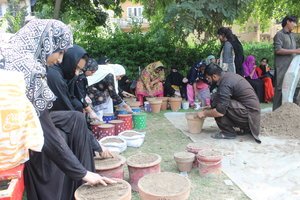
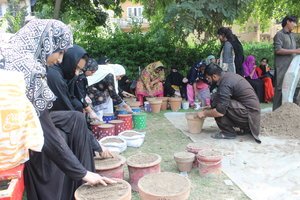
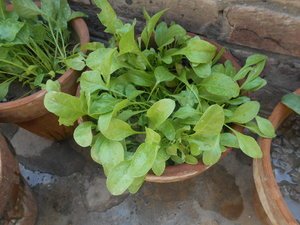
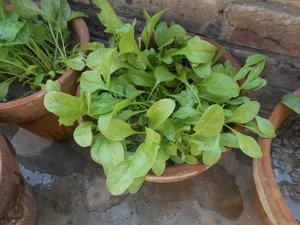
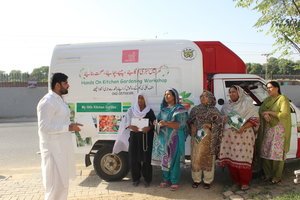
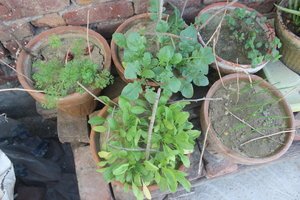
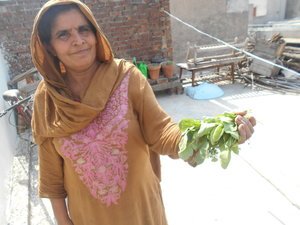
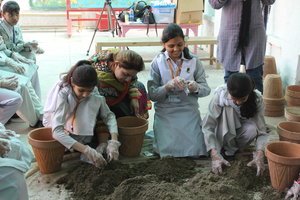
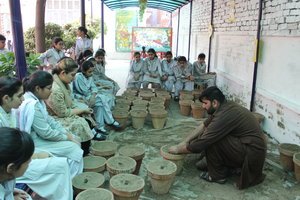

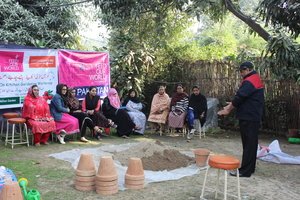
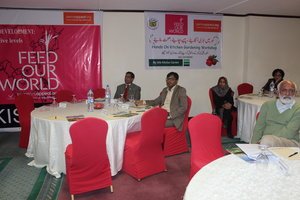
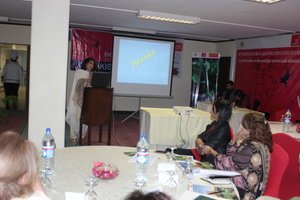
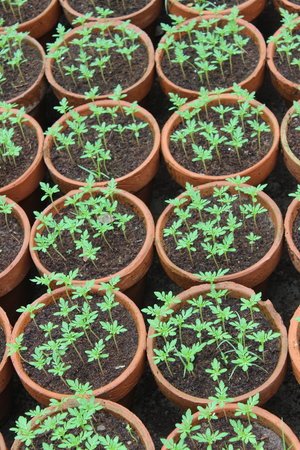
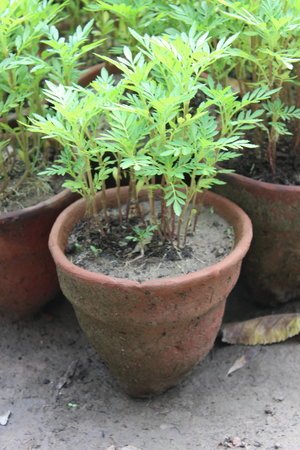
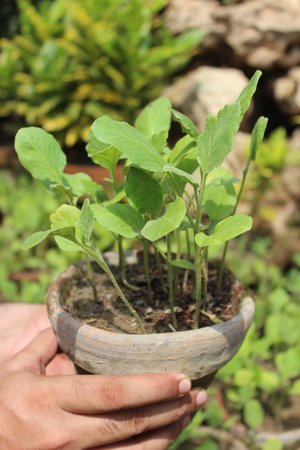
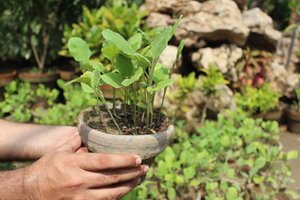
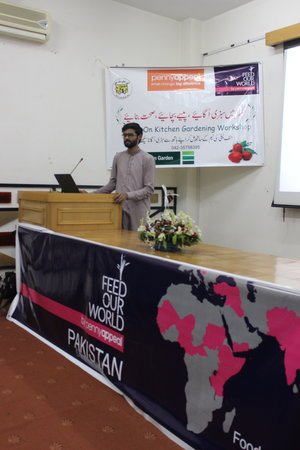
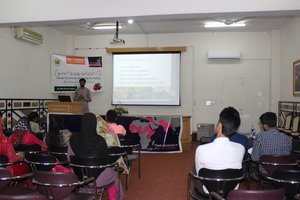
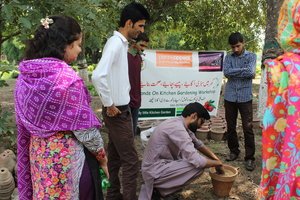
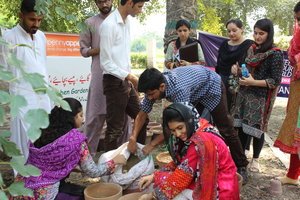
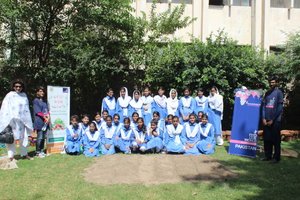
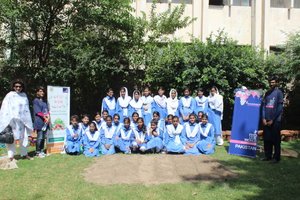
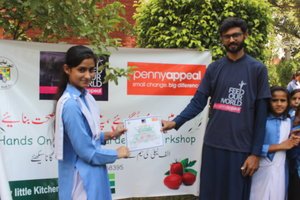
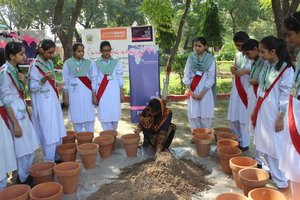
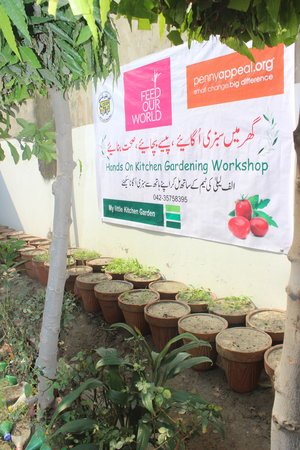
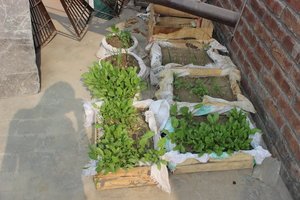
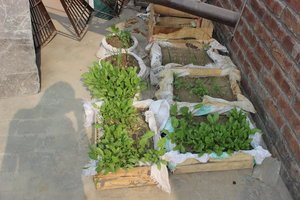
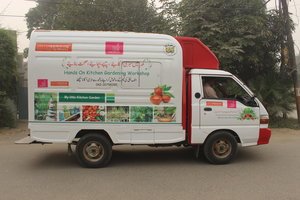
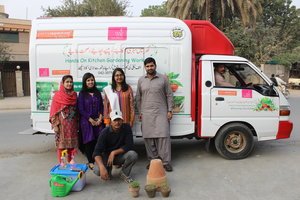

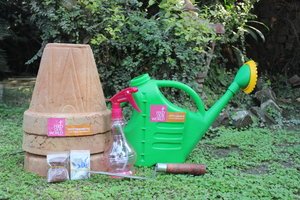
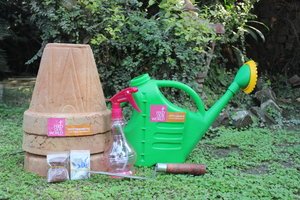
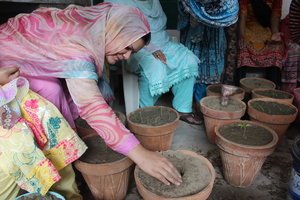
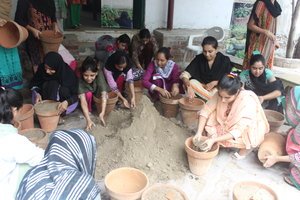
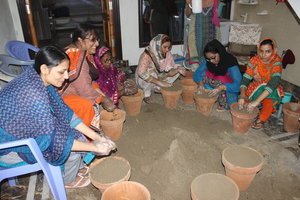
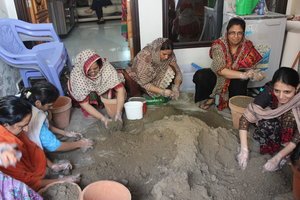
KPK Reads
Background/Rationale:
In 2013-14 ALBBS through financial assistance provided by USAID under its Small Grants Program undertook a year-long intervention in Districts Muzaffargarh and Multan. Under the said initiative titled, ‘Read, Lead, Succeed’ the organization set up libraries in 100 government primary schools, while covering an additional 40 through its mobile library. An Assessment Survey carried at the end of project brought forward the success obtained by the project on the overall showing an increase in students’ and their families’ interest in reading.
Inspired by the success of this intervention ALBBS decided to replicate the same, albeit with a few alterations, in KPK because:
According to the findings of ASER study (2014), only 34% children in government primary schools in KPK are able to read a grade appropriate story in Urdu, and only 35% can do so in English, made KP the obvious choice for the planned intervention.
Whereas, within KP, Districts Bannu and D. I. Khan in view of the heavy influx of Internally Displaced Persons (IDPs) thereat, and the fact that this segment of population fares even worse on reading skills in both Urdu and English, made it the ideal place for this initiative.
Therefore, this project was designed in order to establish a reading culture in KPK and create resourceful assets that will empower us and the people of KPK to positively affect generations to come.
Objectives:
1. To establish 100 libraries in KPK (Bannu and D.I. Khan) to serve as resource centers for government primary schools; allowing the girls and boys to experience an enriching reading experience at an early stage of their life.
2. To train 200 teachers in KPK (Bannu and D.I. Khan) in library management and utilization; who will be able to take this initiative forward even once the project has ended, allowing a sustainable impact and more positive outcomes for future generations.
3. To foster a reading culture among the people of KPK by arranging awareness campaigns (Bannu and D.I. Khan) and a policy dialogue (Peshawar) ; in collaboration with the government institutions, educational sector and civil society officials.
Expected Outcomes:
· 100 Library Corners
· 200 Trained Teachers
· Teacher Training Manual
· Project Assessment Report
· Campaign Song
· Sustainability Mechanism
Supported by: USAID’s Small Grants Ambassador’s Fund Program – National Rural Support Program (SGAFP –NRSP)
This activity was made possible with support from the American people delivered through the U.S. Agency for International Development (USAID). The contents are the responsibility of Alif Laila Book Bus Society (ALBBS) and do not necessarily reflect the opinion of USAID or the U.S. Government.
1. UMEED-E-JAWAAN (USAID-CREATIVE) 2014-2015
Public libraries are logical partners for local economic development initiatives that focus on people and quality of life. With a shift in the role of public libraries –from passive, recreational reading and research institutions to active economic development agents the District PublicLibraries can playan important and dynamic part in the community’s learning infrastructure which supports local, regional and national economic development.
Keeping this objective in mind ALBBS is focusing on upgrading the facilities of District Libraries on Multan, Muzaffargarh and Bahawalpur. In addition to that ALBBS is also going to conduct two workshops in all three districts for the youth;
1. Interviewing Skills and Career Counseling
2. Capacity building through Entrepreneurship
Southern Punjab is home to many universities and colleges. A reliable resume for a serious company is very important as it makes the first impression about a person hence it is very important for the college graduates and job seekers to know how to write a good resume as well give a successful job interview. Furthermore power of entrepreneurship is universally recognized. New and successful enterprises create jobs, spread wealth, increase social mobility, bring about technological innovations, and overall improve people’s living standards. We believe through this project we can open up new avenues for our youth.
2. DIGITAL MEANS (ILM IDEAS-DIFID) 2013-2015
To increase access to quality education and improve learning outcomes in English at grade four/five level and after the roaring success of our earlier project Digital Doors in 2012, ALBBS has joined hands with Ilm Ideas to develop e-learning content. In this project we have also focused on facilitating the teachers and build their capacity through use of technology (audio visual aids).
3. PAKISTAN READING PROJECT (USAID-IRC) 2013-2018
Since its inception Alif Laila has aimed to enhance the capabilities, understanding and the innovative prowess of Pakistan’s youth. We believe the best way of enabling children is through books, education and vocational skills. In Pakistan, access to quality reading material is restricted mostly to urban areas and to the more affluent classes. Our low literacy rate and the expense of education in general restrict children’s perusal only to textbooks assigned in school. Those children who are not enrolled in schools have no access to books of any sort.
The Pakistan Reading Project aims to improve the quality of reading in public and private schools across all of Pakistan, supporting at least 2.5 million additional primary school students to read at a level commensurate with standards at their grade level. To achieve this goal, Alif Laila has been given the task to establish 300 community libraries nationwide. These libraries will be set up in Punjab, KPK, Balochistan, FATA, AJ& K, G.B and ICT through an open solicitation for community libraries support program.
--------------------------------------------------------------------------------------------------------------
Alif Laila CCE Creative Partnerships Program 2015-2016
PROGRAMME SUMMARY
The programme in Lahore is modeled on the Creative Partnerships (CP) programme in England which is the largest and longest-running creative learning programme of its kind in the world. CP is widely recognized as an international leader in bringing arts, culture and creative approaches into the classroom. CP supports the development of young people’s creativity by bringing artists into schools to work alongside teachers on long term projects in the curriculum. Alongside developing the creativity of learners, CP is a professional development programme for teachers and it supports them to develop new skills and introduce more creative approaches to teaching and learning. The sustainable impact of the CP programme in Lahore will be achieved by embedding long term changes is the practice of teachers and by providing opportunity to share and spread this practice to other teachers in the same schools.
Creativity, Culture and Education (CCE) lead the CP programme in the UK. They were also involved in the design and delivery of the programme in schools in Karachi and in a pilot CP programme in Lahore which began in 2015. In the UK, CP was launched in 2002 and ran for almost 10 years. In the Academic year 2010/11 CP worked directly with 2,500 schools in England, both primary and secondary. The success of the programme in the UK led to it being adapted and introduced in a number of other countries in Europe. There are now programmes modeled on Creative Partnerships in Lithuania, Norway, Sweden, Germany, the Czech Republic and Hungary, and programmes are under development in other countries around the world.
The programme was recognized by the World Innovation Summit for Education in 2011where it received the WISE award for its outstanding contribution to innovation in world education.
1. The need for creativity
In the modern economic climate, workers will need to be far more flexible, ready to learn new methods and skills, be prepared to change employment regularly, and to take and to manage risk. This will require discipline, resilience, curiosity, and imagination. The modern work environment also requires strong team players, and workers who can collaborate effectively with people from many different backgrounds. These workers will need to be self-motivated, good problem solvers and decisive. In Pakistan, these skills will be particularly important if young people are to succeed in the face of the acute challenges they face and the rapidly changing jobs market they will enter.
The same set of skills also underpins successful learning. It is important therefore that formal education settings are able to nurture and develop these creative skills in parallel to, and in support of, knowledge acquisition. But the value of these skills extends beyond education and work. They are also useful tools in developing well rounded children and young people who are willing to be active, engaged participants in the community and in the social and political life of Pakistan
2. The approach
The Creative Partnerships project work in each participating school will operate from [insert dates from Paul’s email]. Each project will be designed to focus on and address a specific challenge which is impeding the successful development of the participating school, examples include: the need to improve pupil motivation; poor behavior; poor academic achievement or parental engagement. Experience shows that approaches which tell schools what their needs are, and what to do to address them, rarely work as they have insufficient buy in or ownership from them and their teachers. Whilst these challenges will vary across schools, the common thread of all the projects will be the partnership work between teachers, pupils and artists.
Participating schools will identify a specific group of pupils and teachers to participate in the project work which will be integrated into the school curriculum. The participating teachers from each school will be involved in a 2 day initial training programme lead by CCE. The project work is supported by a Planning and Evaluation Framework which includes a project planning and a project completion form. The framework supports participating schools to establish and review the impact of each project, the extent to which the specific challenge identified at the start has been addressed, and the learning of all the partners involved (pupils, teachers and artists). It also draws on existing school monitoring data to establish both the starting point and the progress made during the project work in the following areas:
· pupil attainment (academic results)
· pupil attendance; and
· pupil motivation and engagement.
Independent research into the impact of Creative Partnerships provides compelling evidence that the programme has a positive impact on all of these issues.
3. Project partners and their roles
Alongside CCE there are two partners involved in the management and coordination of the Creative Partnership programme in Lahore – Care and Alif Laila. Their dedicated Project Managers will support the schools and the artists in the programme through ongoing conversations and visits. Representatives from CCE will also visit some of the participating schools. In addition the project managers in Lahore and CCE will be in regular contact assessing progress and addressing issues that have arisen.
4. The impact
Evidence from independent research commissioned by CCE highlights that as well as developing the creativity of children and young people, CP also has a significant impact on pupil attainment, behaviour, confidence, motivation and attendance while stimulating increasing levels of parental engagement in their children’s education.
In addition to evaluations of the programme undertaken by leading universities and research institutes in the UK, such as Cambridge University, Nottingham University and the National Foundation for Educational Research, the programme was twice inspected by the UK schools inspection organisation, Ofsted. In 2010 they concluded:
Schools in challenging circumstances̶ those with a higher than average proportion of pupils eligible for free schools meals, low attainment on entry and high rates of pupil mobility̶ showed the greatest improvements in pupils’ ability to draw discerningly on a range of data and work collaboratively to solve problems; their reading and writing; their speaking and listening; and their personal development.
5. Creative Partnership projects and impacts
The Creative Partnerships programme in Lahore aims to support schools to deal with their individual school challenges or development priorities.
5.1 Project Focus
Each project in a school will be designed to address a specific pre-existing problem which is impeding the academic progress of pupils in the school. The area of focus will vary between schools and the project partners Care and Alif Laila will discuss these issues with each participating school.
The Planning and Evaluation Framework for Creative Partnerships includes project planning and completion forms. These are used to establish the impact of each project and the extent to which the specific problems identified at the start have been addressed and resolved.
5.2 General improvement in educational outcomes of pupils
Alongside the resolution of specific issues, the project planning and evaluation forms will also draw on school monitoring data to establish both the starting point and the progress made during the project in the following areas:
• pupil attainment (academic results)
• pupil attendance
• pupil motivation; and
• levels of parental engagement in school.
Independent research into the impact of Creative Partnership provides compelling evidence that the programme has a positive impact on all of these issues.
5.3 Improvement in capacity and development of skills of teachers
Research on Creative Partnerships programmes elsewhere has shown that in addition to the impact on school issues and general academic progress, the Creative Partnerships programme has a profound impact on the skills and practice of the teachers engaged in the programme. Through the project planning and evaluation forms the overall impact of the programme on skills and practice will be documented and reported. The sustainable impact of the programme is usually achieved because teachers are prepared to embed the new practice they have learnt in their daily teaching practice.
Alif Laila Creative Partnerships Project 2015-2016
------------------------------------------------------------------------------------------------------------------------------------------
4. READ LEAD SUCCEED (USAID-SGAFP) 2013-2014
With the objective to develop and foster a reading culture in such localities for women and children and to lead to an easy access to books by all specially young girls, Alif Laila was successful in setting up 100 Library Corners and 40 Mobile Libraries in these schools in the Districts of Multan and Muzaffargarh of Southern Punjab.
Setting up libraries requires the huge responsibility of its smooth operation and management. Alif Laila envisaged this and trained 280 teachers in the district of Multan and Muzaffargarh to develop a strong library task force. Management of Libraries requires a lot of responsibility from storing books, to keeping a track and taking care of these precious resources. These teachers were taught the Library Utilization and Management Techniques.
5. DIGITAL DOORS (ALBBS-PASHA) 2012-2013
In collaboration with the Pakistan Sofware House Association (PASHA) The Alif Laila team developed digital education based on the lessons and curriculum structure of Punjab Text Book Board 2006. Five lessons were successfully completed for grade 4 and 5 focusing on English Language, English Grammer, Spoken English, Reading and Writing Skills.
6. COMMUNITY LIBRARIES (ALBBS-PUBLISHERS) -2013
Alif Laila Book Bus Society believes in empowering women and making them leaders of their communities. Women are the back bone back bone of a society and if a girl is educated and socially aware then her children and ultimately the entire community harbors positive growth and development.
ALBBS set up five community Libraries, at the start of this year, in different localities of Lahore namely, Johar Town, Township, FC Colony, Nishtar Colony and Railway Officer's Colony Walton. Women have stepped up and have volunteered to take responsibility to make a library corner in their homes so that young children and girls can benefit from them. This initiative plays a critical role in involving children in their free time in a healthy positive activity decreasing street crimes or terrorism.
Each female has been provided with 200 books by ALBBS. They have been given training individually on Library Management and Utilization. The response has been extremely positive and encouraging and over a thousand children have been benefited from this initiative.
7. LIVING LIBRARIES (ALBBS-FOSI) 2011-12
This was a unique one of a kind project which ALBBS did with Foundation Open Society Institute (FOSI). In this an effective model library set-up allowing school-going and out of school children access to a wide variety of books in the district Sheikhhupura. A mobile library was also provided in the same time in which 40 schools were covered. In addition to that local school teachers were trained in Library Management.
8. SCHEHREAZADE KA KHAZANA (SAVE THE CHILDREN) 2008-2009
In 2008/2009 Alif Laila collaborated with Save the children alliance, in the libraries project entitled "Scheherazade ka Khazana' to provide 59 libraries for public schools all over Pakistan. THe concept behind the project was to bring children and books together in a brilliant, vivacious and magical environment so that they develop a life-long relationship with books and reading












